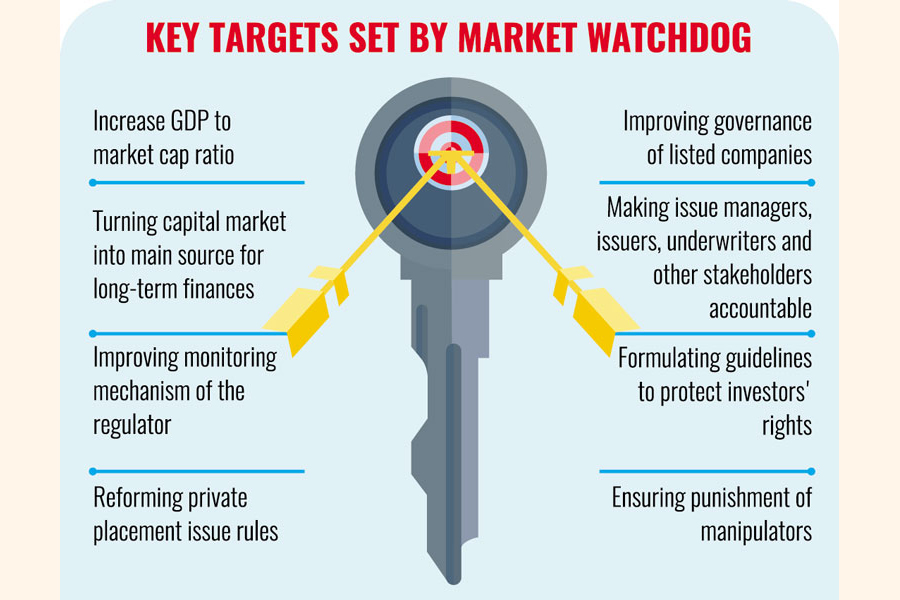
Published :
Updated :

A task force has been formed with university professors, chartered accountants, and professionals to identify reasons as to why the equity market is insignificant in size compared to the country's gross domestic product.
They will recommend ways to expand the market and other reforms necessary for it to thrive.
The Bangladesh Securities and Exchange Commission (BSEC) on Monday formed the task force, with the aim of developing the market, restoring investors' confidence, and ensuring good governance.
A directive has been issued in this regard. It, however, did not mention any timeframe for the completion of the tasks.
The BSEC said the task force would submit its recommendations to the commission within a 'logical' period on receipt of opinions from related parties in a bid to help attain global practices in the market.
The members of the task force are Dr. Helal Uddin, a professor of Dhaka University, KAM Mazedur Rahman, a former managing director of Dhaka bourse, AFM Nesar Uddin, CFA, a partner of Huda Vasi Chowdhury & Co., Dr. Md. Mostafa Akbar, a professor of Bangladesh University of Engineering and Technology, and Al Amin, an associate professor of Dhaka University.
The terms of reference (ToR) set for the task force said it would submit proposals to help frame policies for the economic sector.
The market cap-to-GDP ratio is used to determine whether a market is undervalued or overvalued compared to its historical average.
It, however, carries little meaning in the current scenario of the capital market.
The country has the least market cap-GDP ratio when compared with neighbouring countries and peers, which indicates that the market has remained neglected for years in the absence of a sufficient number of good companies.
The ratio stood at 11.60 per cent for Bangladesh's market, including the debt securities, as of July this year whereas the ratio is above 100 per cent in India and more than 80 per cent in Nepal. The ratio is much higher in developed countries.
In its report, the task force will also include recommendations regarding ways to turn the capital market into a source of long-term financings instead of the banking sector.
Examining the existing challenges, the task force will suggest means to ensure good governance and accountability of the capital market and stakeholders, such as the bourses and the depository authority.
It will also be responsible for showing ways to enhance the BSEC's institutional capacity, internal good governance, and automation, and to ensure information secrecy.
Moreover, the securities regulator will put forward its recommendations regarding necessary amendments to public issue rules, rights issue rules, margin rules, debt securities rules, and investment sukuk rules, among others, to make them time befitting.
The BSEC wants to ensure punishment of market manipulators and violators of the insider trading rules by setting a specific penal code.
Apart from making recommendations for legal reforms, the task force will suggest how listed companies and market intermediaries can be made accountable.
The BSEC seeks advice to attain a state-of-the-art surveillance system as well to bolster its capacity as market watchdog.
mufazzal.fe@gmail.com


 For all latest news, follow The Financial Express Google News channel.
For all latest news, follow The Financial Express Google News channel.